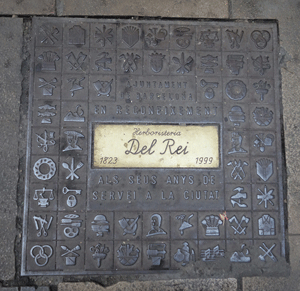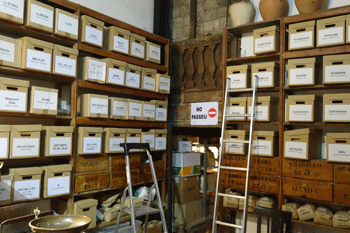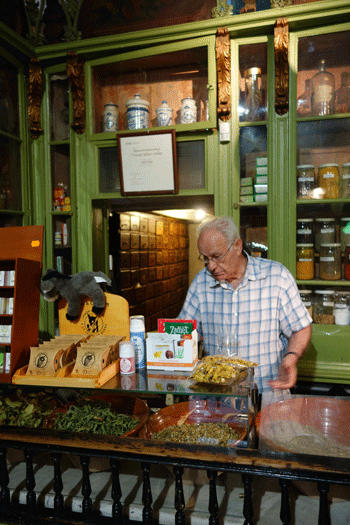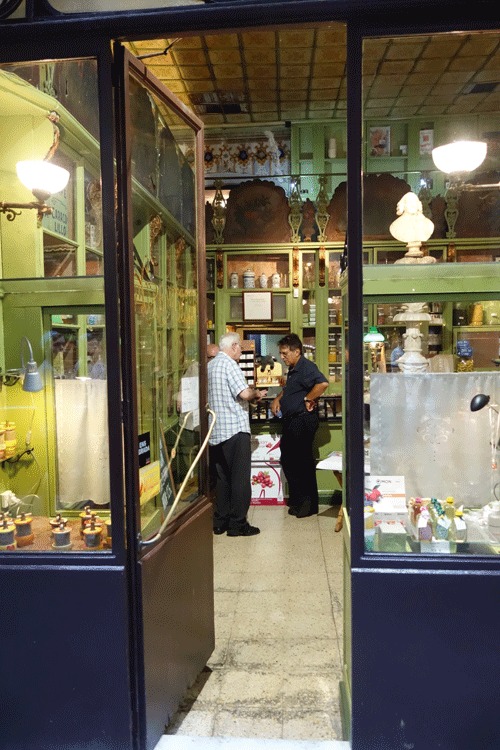Recently, Michael and I taught in England, and as we generally do when teaching there we also traveled to other countries. And of course we just had to investigate the herbal scene wherever we went, too. This month we are both blogging about different aspects of what we found about the general state of herbal medicine in Europe. Older generations of most cultures have long complained how their youth detach from traditional ways in favor of modern Western living. The same can be said of herbalism. In Russia, we learned that herbalism is alive and well, although mainly with the elderly population. Unfortunately, this is also the case in Mexico (as we learned while there earlier this year) as well as in other countries.

Street plaque
Ever since Western conventional medicine came to the forefront in the early 20th century, it has swept the world as the only medicine to use. The herbal renaissance in America that began during the 1970’s (well, 1960’s if you count marijuana!) created an impression that herbs are alive and well and growing. They are in the United States, but the European Common Union (EU) is crushing herbalism in most parts of Europe (particularly in the UK; see Michael’s blog). This is especially true in the UK, which used to be the last bastion of freedom for herbs and natural healing. While there are still many people using and teaching herbs there, they do so under increasingly stringent regulations and smothered resources. while the UK matches the EU’s regulation of only medical doctors prescribing herbs.
Given this sad state of herbal affairs, imagine Michael’s and my surprise when we strolled through the stone-paved ancient Gothic district in Barcelona (near La Rambla) only to stumble across the Herbolari (or Herboristeria) del Rei, self-proclaimed oldest herb shop in all of Spain. Established in 1818 (and moved to this location in 1823), is still fully stocked and operational. It immediately took me back in time to the “olde-time shoppes” in England and the States. Imagine standing in an herbal Ollivander’s Wand Shop in Harry Potter’s Diagon Alley and you’ve got the idea! To give you an idea of the almost 200-year history of this place, supposedly, Queen Isabel II shopped there for lavender for her baths! Thankfully, many more customers have come and gone so the store has stayed in full operation these last two centuries, recognized by a pavement plaque in 1999 when it was declared a site of culture and interest for tourists.  When we entered the store and breathed in its history, we met one of the proprietors along with his English-speaking nephew. They happily gave us a tour and we gazed upon cabinets of wooden drawers, much like those found in traditional Chinese herb stores, and a store room stuffed with sturdy cardboard boxes, all holding hundreds of plants (I believe he told me 263?). Other shelves held bottles of syrups, elixirs, tinctures, wines, olive oils, beauty products, candies and to Michael’s delight, chunks of pure licorice extract, which is very hard to find. The shop itself is exquisite with its Elizabethan style decorations, statues, oil and watercolor paintings, wooden panels, hand-painted tiles, glass cabinets, and central marble fountain.
When we entered the store and breathed in its history, we met one of the proprietors along with his English-speaking nephew. They happily gave us a tour and we gazed upon cabinets of wooden drawers, much like those found in traditional Chinese herb stores, and a store room stuffed with sturdy cardboard boxes, all holding hundreds of plants (I believe he told me 263?). Other shelves held bottles of syrups, elixirs, tinctures, wines, olive oils, beauty products, candies and to Michael’s delight, chunks of pure licorice extract, which is very hard to find. The shop itself is exquisite with its Elizabethan style decorations, statues, oil and watercolor paintings, wooden panels, hand-painted tiles, glass cabinets, and central marble fountain.

Since Aunt Trinidad Sabates, honored as a master of medicinal plants by the Generalitat de Catalunya, was not in, we didn’t get to ask specific questions. She offered to come down but as we had another engagement right then, we settled on returning two days later. Unfortunately, when I did come back it was raining and the shop was closed. I understand that although there are normal Tues-Fri hours (4-8 pm), it’s not unusual for them to close like this, similar to other stores in fun-loving Barcelona. As we had to fly to England the next day, we never did get to meet Trinidad, so someday we’ll have to return. I did learn, however, that the shop is much visited and people still request herbal solutions for their health conditions, a rarity in the EU these days. Unlike other countries in the EU, Spain doesn’t suffer the same restrictions such as Germany and France where herbs can only be prescribed by licensed medical doctors. So if any of you plan to visit Barcelona, be sure to stop by this incredible landmark that is keeping herbalism alive and well for Catalonia, Spain! Herboristeria del Rei (Herbolari del Rei): located through a side passage near the Royal Square/Plaza Real in the Street of Glass # 1, or Carrer del Vidre, 1, 08002, or through the street Carrer de Ferran.


How come the same restrictions don’t apply in Spain??? Is this something that can be done with other countries in the EU!
Looks like fun.